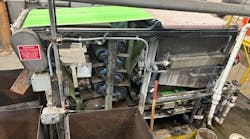During the past decade, there has been increased concern regarding the potential adverse environmental effects of endocrine disrupting compounds (EDCs), a group of chemicals that may affect the endocrine system in humans and wildlife. The Water Environment Research Foundation is working to provide answers to deal with this emerging issue. Specifically, WERF research is looking at the fate of EDCs in wastewater in order to develop treatment technologies and analytical techniques which can successfully monitor EDCs in the products of wastewater treatment. This research also will determine what potential impacts EDCs may have on environmental health.
Interest in EDCs has risen with the emergence of analytical technologies capable of detecting these compounds at extremely low levels in the environment. Unfortunately, limited and often contradictory information is available regarding these compounds and their environmental fate and potential effects. Since 1999, WERF has been closely following and contributing to the science of this issue.
„Because we are dealing with wastewater, measuring compounds that appear in trace amounts creates unique challenges for scientists–challenges we are trying to overcome through research, says Glenn Reinhardt, executive director of WERF.
EDCs can end up in the municipal and industrial wastewater treatment system, either through direct discharge into the sewers or via stormwater run-off. To address this, WERF has either initiated or contributed to several research studies investigating the occurrence of EDCs in wastewater effluent and surface water, analytical method development, and compound fate and transport through wastewater treatment processes. Our research in this area is currently valued at nearly $2.3 million. In addition, WERF cooperates with several other organizations on this topic, including the Global Water Research Coalition (GWRC), www.globalwaterresearchcoalition.net/, a water research alliance of twelve leading research organizations from seven countries. EDCs were selected as the first priority cooperative research area by these members.
One of WERF's most recent EDC projects is developing a guidance document aimed at wastewater treatment-related issues. This project, Fact Sheet on Endocrine Disrupting Chemicals and Implications for Wastewater Treatment (project no. 04-WEM-6), will provide information to wastewater treatment plant operators that answers their questions on EDCs and provides accurate information that they can then pass along to their customers and communities.
Source: Water Environment Research Foundation

